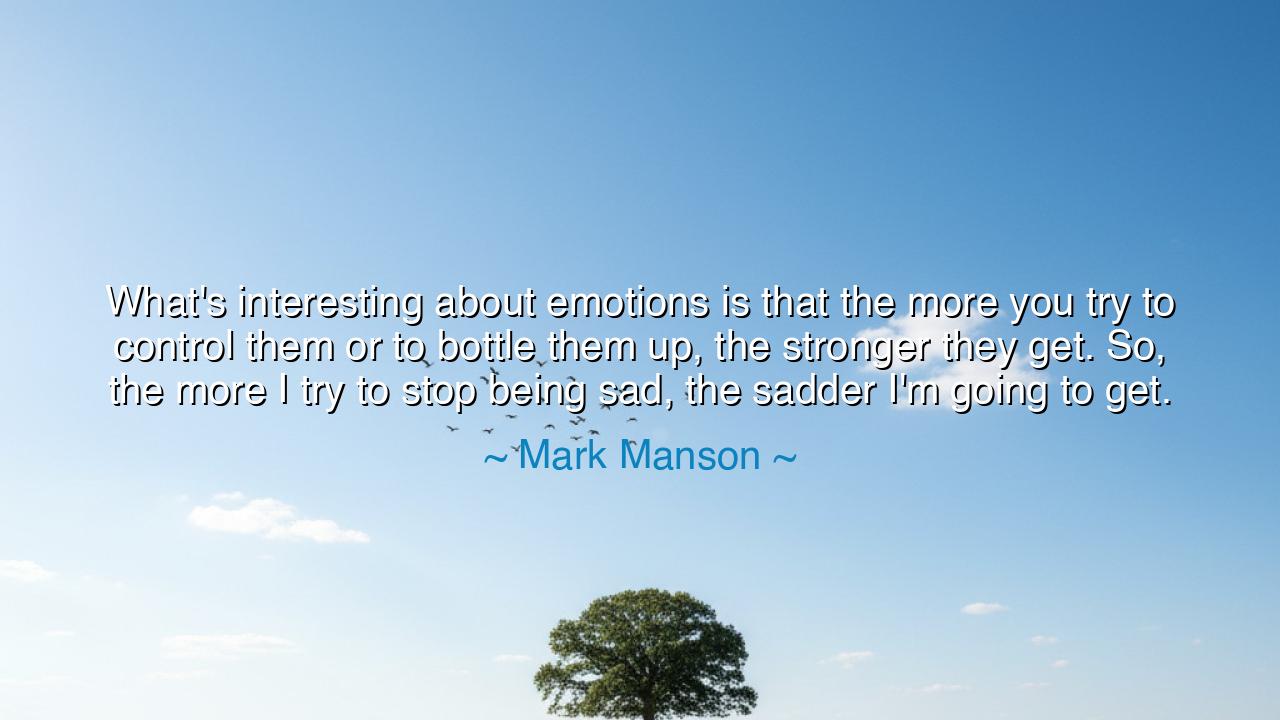
What's interesting about emotions is that the more you try to
What's interesting about emotions is that the more you try to control them or to bottle them up, the stronger they get. So, the more I try to stop being sad, the sadder I'm going to get.






Hear the words of Mark Manson, spoken with the clarity of one who has wrestled with the hidden tides of the human heart: “What’s interesting about emotions is that the more you try to control them or to bottle them up, the stronger they get. So, the more I try to stop being sad, the sadder I’m going to get.” In this teaching lies an eternal paradox: that what we resist in our hearts does not vanish but grows more powerful, like a shadow fed by our denial. To turn away from sorrow is not to conquer it, but to bind it closer to ourselves.
The meaning is clear yet profound. Emotions are not enemies to be slain, nor storms to be locked away in secret chambers of the mind. They are signals of our humanity, rivers that must flow if they are not to stagnate. When we bottle them up, they ferment, becoming heavier, more bitter, more potent than before. To deny sadness is to invite greater grief; to deny anger is to risk explosion; to deny fear is to give it dominion. True strength is not the suppression of feeling, but the courage to acknowledge it, to let it pass through us like wind through trees.
The ancients saw this truth. The Stoics, often misunderstood as cold, did not teach the denial of emotion, but its understanding. Marcus Aurelius wrote in his Meditations that when sorrow comes, we must not flee from it, but study it, let it be, and then choose how to act. For he knew that resistance without acceptance multiplies suffering. The Buddhists too, in their teachings, declare that clinging and aversion are the roots of pain: the harder one tries not to feel, the deeper the feeling binds itself to the soul.
History, too, gives us examples. Think of Abraham Lincoln, a man often shadowed by melancholy. Had he denied his sadness, he might have been consumed by it in silence. Instead, he lived with it, spoke of it, and even carried it into his speeches, where sorrow was transfigured into wisdom and compassion. His acknowledgment of his own pain gave him the strength to lead a divided nation. His life demonstrates Manson’s truth: that to embrace sadness honestly is to find power in its depths.
Thus, we see that emotions are not weaknesses but teachers. Sadness teaches us compassion; fear teaches us caution; anger teaches us where injustice burns. To suppress these is to lose the wisdom they carry. Yet to dwell endlessly in them is also folly. The path of wisdom lies in balance: to feel them, to honor them, but not to be ruled by them. As waves crash and recede, so too do feelings when they are given space to move.
The lesson, O seeker, is this: do not wage war upon your own heart. When sorrow comes, allow yourself to weep. When fear rises, allow yourself to tremble. When joy visits, allow yourself to laugh. By granting space to emotion, you lessen its grip. By naming it, you strip it of its hidden power. To deny is to inflame; to embrace is to transform.
Practical is this counsel: when you feel sad, do not rush to distract yourself or bury the feeling beneath busyness. Instead, pause. Breathe. Write of it, speak of it, sit with it. Share it with a trusted friend. Treat it not as poison to be hidden, but as medicine bitter yet necessary. And when it passes, you will find yourself lighter, freer, wiser.
Thus, Mark Manson’s words resound as a timeless reminder: “The more I try to stop being sad, the sadder I’m going to get.” Let us not be enemies of our own hearts, but companions to them. For in walking with our feelings rather than against them, we discover not weakness but strength, not despair but resilience, and not bondage but freedom.






AAdministratorAdministrator
Welcome, honored guests. Please leave a comment, we will respond soon